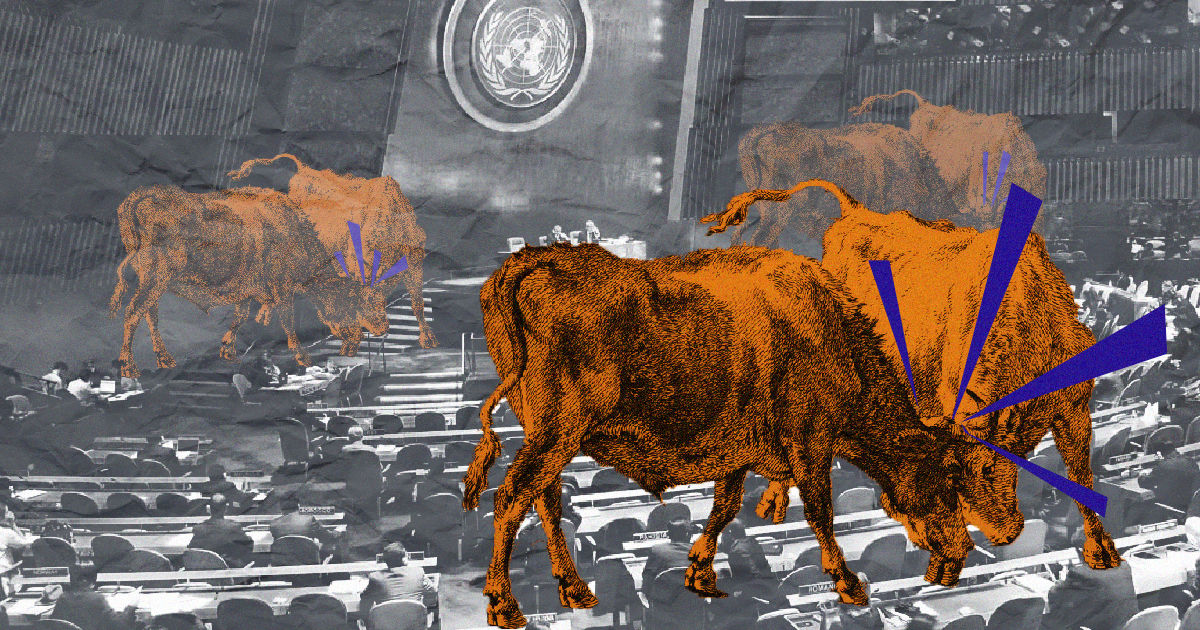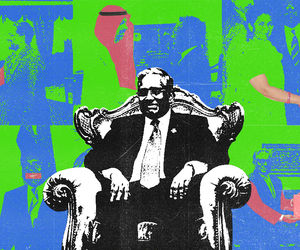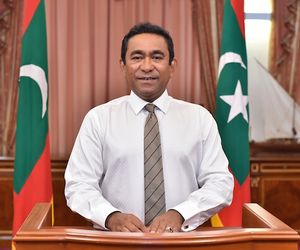"Act our size": Dr Shaheed on principled pragmatism for the Maldives in a multipolar world
A Q&A with the former foreign minister and UN special rapporteur.

Artwork: Dosain
01 Apr 2025, 17:02
For our exploration of the geopolitical challenges revealed by the Russian ambassador's public scolding two former presidents, we spoke to Dr Ahmed Shaheed, a former foreign minister, UN special rapporteur and international human rights law professor at the University of Essex.
The following are his detailed and unedited responses.
On the Maldives stance concerning Russia's invasion of Ukraine
It is important to bear in mind that foreign policy should be based first and foremost on the country’s abiding national interests and these are determined by a number of generally fixed characteristics such as national attributes (such as size of state, location, economic structure, national identity) and systemic attributes beyond our control (such as presence/absence of regional and or international actors, existence/non-existence of relevant international norms, high/low levels of tension amongst great powers).
Therefore, it should not surprise anyone that that a country does not change its voting stance across administrations especially on issues of high international interest. Consistency in foreign policy is usually a good thing, and it contributes to building international community’s trust and confidence in the country.
On whether support for resolutions calling for withdrawal of Russian troops contradicts avowed neutral or non-aligned stand
I do not think that supporting the sovereignty and independence of small states is at all inconsistent with a ‘Non-Aligned’ foreign policy. In fact, supporting the sovereignty of small states has been at the core of the ideology of Non-Alignment.
The concept of a ‘Non-Aligned’ foreign policy was articulated originally in a very different world – in the late 1950s during the height of the Cold War when the superpowers were busy recruiting states into their blocs or alliances through various ‘Pacts’. The ‘Non-Aligned’ nations opposed being drawn into these orbits and wanted to be militarily and politically neutral between these two blocs.
Over time, they developed or identified a set of principles or positions that would constitute their platform. These included the rejection of hosting military bases, support for decolonisation and national self-determination, opposition to apartheid and racism, upholding sovereignty of small states, rejection of armed intervention, creation of nuclear weapon free zones and calling for disarmament, as well as a host of economic demands including permanent sovereignty over natural resources. Some of these calls such as those for decolonisation and for a ‘New International Economic Order’ were made in alliance with the wider group of so-called ‘Third World’ countries.
The elements of this platform have changed overtime but opposition to armed intervention in a sovereign state has always been an important pillar of the Non-Aligned Movement; and so, it does not call for neutrality in the face of foreign intervention or violation of the sovereignty of a state.
On challenges facing small island states and navigating potential conflict between India and China
This is not an easy question to answer in two sentences. I wrote a whole PhD on this subject – ‘Micro-states and room for diplomatic manoeuvre.' The insights that can be drawn from the experiences of other states in similar situations, and these remain valid, include ensuring that we never act in a way that will create distrust or suspicion in any two states to a contest and ensure that we do not let one or other party use us as a Trojan horse for them.
Efforts must be made to minimise being overly dependent on one state or even two states, and nor should we ever provoke any of these parties or undermine any of their strategic interests. Our policies must demonstrably be tied to legitimate key national objectives and not be vehicles to promote the interests of other states, especially those who may be newer actors in the region or who are extra-regional powers.
It will not always be easy or possible to ensure that our policies align squarely with those of New Delhi or Beijing or even Colombo, but we should be able to explain and justify why we pursue specific policies. It requires the government being mindful and respectful of the sensibilities of our neighbours and partners, and engaging in frequent and frank high-level dialogue, and promoting a rules-based order.
However, we must always act our size, be both pragmatic and principled, and never politicise our bilateral relationships. In recent years, several political parties have tried to play off one foreign government against the other in domestic politics – this is always a huge mistake.
If tensions between India and China were to lead to open conflict, that would spell a disaster to all those in the region, including the Maldives. Neither state should reasonably expect that Maldives would join such a conflict in military terms, but we should aim to persuade both parties that Maldives would first and foremost seek to ensure its own survival. What Maldives can do specifically depends a lot on the detail: scale, intensity, length of the conflict, and the circumstances of the outbreak. However, when push comes to shove, the fate of Maldives is tied to the fate of India.
On adapting to new multipolar world order and risks posed to Maldivian sovereignty and territorial integrity from weakening of post-1945 rules-based order
The unipolar world is long gone! It began with Bush senior and ended with Bush junior, running from the first Gulf War to rescue Kuwait to the second Gulf War to capture Iraq. The lack of US response to the Green Revolution in Iran in 2009 was one of the early signs that the unipolar moment was gone.
Similarly, the rise of BRICs, the influence of the European Union as well as various impacts of globalisation all speak to a more heterogenous and multipolar world.
The UN charter system, under-written by the United States, and mobilised by the Third World movement for decolonisation, has been very beneficial to small states, embedding the principles of sovereign equality of states and non-interference in the internal affairs of states.
The Maldives owes its independence as a sovereign state to Amin Didi’s foresight in securing the 1948 agreement and Ibrahim Nasir’s timely application to become a UN member state in 1965. Without these timely moves we may have had a very different history.
Throughout its UN membership, Maldives had supported applying the principles of the UN charter to all cases, regardless of our relationship with the states concerned—see our positions on East Timor, Western Sahara, Northern Cyprus, or Kosovo. International law also provided the basis to demarcate our maritime borders with India and Sri Lanka, to protect our maritime zones and to lay claim to a vast area of the continental shelf.
The Maldives also invoked the UN system to protect itself against territorial attack by pirates and mercenaries in securing UN consensus on a framework to protect small states with regional assistance offered under the UN’s umbrella. Similarly, it is this system that offered the Maldives the opportunity to trigger the recognition of a human right to safe and healthy environment.
When such a system collapses, what could emerge in its place is one where rules and norms do not matter. Where rules are weak, balances of power would matter; but even then, small states would be disadvantaged. Where there is no balance of power, a sphere of influence with a regional hegemon would emerge and maintain order on its terms.
On balancing principled stand on UN resolutions against economic realities with China and Russia as the top source markets for tourists
I believe every vote is unique – even if it is the same resolution that is voted in different years, this could still be the case. It is important to be principled but that does not rule out being pragmatic – never provoke a state that can inflict damage on you. What is more important than being principled is being transparent and being able to justify one’s position.
A pragmatic stance grounded in national economic interest would often be acceptable and credible. Moreover, does Maldives have to take a side on every UN vote or even take part in every UN vote? I do not think it is necessary for Maldives to pronounce a position on every issue under the sun, unless it is about a direct interest of the Maldives.
And sometimes it is good to be silent or step out of the heated arenas – which by the way is why I have consistently advised against Maldives seeking a seat in the UN Security Council. If you are member of the Security Council, the national costs of how you vote or do not vote can be very high.
On shifts in the geopolitical landscape
I do not have crystal ball, but it is clear that the US has bitten off more than it can chew and is retreating – from Afghanistan earlier and now possibly from Ukraine. Moreover, it is not clear where US will end up four years from now in terms of its domestic situation – rule of law appears to be under siege and this would clearly have implications for its global standing.
In terms of soft power, the US has dismantled some of the core foundations of its appeal and influence through gutting foreign aid spending and cutting contributions to the United Nations. Also, along with Europe, support for the carnage unleashed by Israel, with credible and widespread concern that a genocide is being carried out, has vastly diminished the global standing of these states.
Do these then favour China? Does China want to fill the vacuum? Is it capable of doing so? I am not sure if the answers to all these questions are very clear yet. Certainly, China’s influence is rising, the trans-Atlantic alliance is under strain, a new landscape of global politics is emerging, and Europe has not yet figured out what it must and can do. And of course, the US still remains very powerful.
In the short run, what is more likely is more disorder and chaos created by opportunism and mismanagement rather than a changing of the guard. What would this mean for small states? Engage in a lot of quiet diplomacy with as many relevant actors as possible and without stepping on the toes of neighbours and big powers
Discussion
No comments yet. Be the first to share your thoughts!
No comments yet. Be the first to join the conversation!
Join the Conversation
Sign in to share your thoughts under an alias and take part in the discussion. Independent journalism thrives on open, respectful debate — your voice matters.




